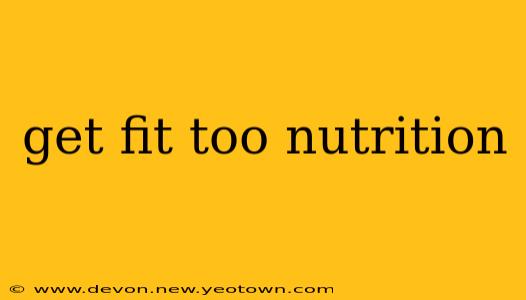Let's be honest, hitting the gym or pounding the pavement is only half the battle. Want to see real, lasting results in your fitness journey? Then you need to fuel your body right. This isn't about restrictive diets or fad trends; it's about understanding the vital role nutrition plays in achieving your fitness goals, whether you're aiming for weight loss, muscle gain, or simply improved overall health. Think of nutrition as the engine that powers your fitness efforts. Without the right fuel, your engine sputters and eventually stalls.
What Should I Eat to Get Fit? (A Balanced Approach)
This isn't about a magic bullet. There's no single "get fit" food. Instead, focus on building a balanced nutritional foundation. Imagine your plate divided into sections:
-
Lean Protein (30-40%): Think chicken breast, fish, lean beef, beans, lentils, tofu, and Greek yogurt. Protein is essential for muscle repair and growth, keeping you feeling full and satisfied.
-
Complex Carbohydrates (40-50%): These provide sustained energy. Opt for whole grains like brown rice, quinoa, oats, and sweet potatoes, rather than refined carbs like white bread or sugary cereals.
-
Healthy Fats (20-30%): Don't shy away from healthy fats! They're crucial for hormone production and overall health. Include avocados, nuts, seeds, olive oil, and fatty fish in your diet.
How Much Protein Do I Need to Build Muscle?
This is a common question, and the answer varies depending on several factors, including your activity level, body weight, and fitness goals. Generally, recommendations range from 0.8 grams of protein per kilogram of body weight for maintaining muscle mass to 1.6-2.2 grams per kilogram for building muscle. Consult a registered dietitian or your doctor for personalized recommendations.
What Are Some Good Snacks for Fitness?
Snacking strategically can prevent energy crashes and keep you on track. Good options include:
- Fruits: Apples, bananas, berries – they're naturally sweet and packed with vitamins and fiber.
- Vegetables: Carrot sticks, celery with hummus, bell peppers – provide essential nutrients and keep you feeling full.
- Nuts and Seeds: Almonds, walnuts, chia seeds – offer healthy fats and protein.
- Greek Yogurt: A protein powerhouse that can be enjoyed plain or with fruit.
What Should I Avoid Eating to Get Fit?
While there's no need for extreme restrictions, minimizing certain foods can significantly improve your results:
- Processed Foods: High in sodium, unhealthy fats, and added sugars, these offer little nutritional value.
- Sugary Drinks: Soda, juice, and energy drinks are loaded with empty calories.
- Excessive Alcohol: Alcohol can interfere with muscle recovery and overall health.
What is the Best Diet for Getting Fit?
There’s no single "best" diet. The most effective diet is one you can stick to consistently. Focus on a balanced approach that incorporates whole, unprocessed foods and fits your lifestyle. Experiment and find what works for you. Consider consulting a registered dietitian or nutritionist to create a personalized plan tailored to your needs and goals. Remember, consistency is key!
The Importance of Hydration
Don't forget water! Proper hydration is essential for optimal performance and recovery. Aim for at least eight glasses of water per day, adjusting based on your activity level and climate.
This journey is about more than just physical transformation; it's about feeling your best. By prioritizing a balanced diet alongside your fitness routine, you'll not only achieve your fitness goals but also cultivate a healthier and happier lifestyle. Remember to consult with healthcare professionals for personalized advice.

